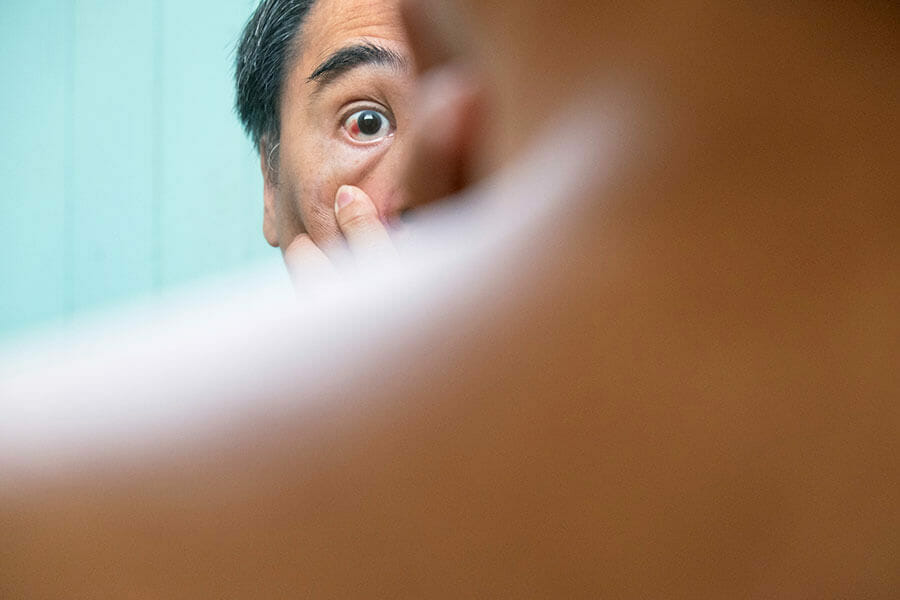Bloodshot eyes can be alarming, but they are not always a cause for concern. In this blog, we will discuss the common causes of bloodshot eyes, how to treat them, and when to seek medical attention. We will also provide some helpful tips for preventing bloodshot eyes in the future.
Understanding Subconjunctival Hemorrhage
A subconjunctival hemorrhage is one of the most common causes of bloodshot eyes. It occurs when a blood vessel under the conjunctiva (the clear membrane that covers the white part of the eye) bursts, causing blood to pool under the tissue. This can result in a bright red or dark patch on the white part of the eye.
Subconjunctival hemorrhages are typically not serious and do not require treatment. In most cases, they will clear up on their own within a few weeks. However, if you experience any pain or vision changes, it is important to schedule an emergency eye exam right away, in this article we discuss when to visit an eye doctor for pink eye.
Causes of Bloodshot Eyes
While a subconjunctival hemorrhage is one of the most common causes of bloodshot eyes, it can often be hard to tell the difference between a burst blood vessel and other causes for red eyes such as pink eye. Because of this reason, it is always a good idea to visit an eye doctor if you are unsure of why your eye is red or bloodshot.
Rubbing or Poking the Eye
Rubbing or poking your eye can cause blood vessels on the surface of your eye to break, leading to bloodshot eyes. While rubbing your eyes may provide temporary relief for itching or irritation, it can cause more harm than good. If you experience persistent itching or irritation, it is best to consult our eye doctor to identify the underlying cause and provide the appropriate treatment.
Increased Pressure in the Body Cavity
Increased pressure in the body cavity, such as during coughing, sneezing, or lifting heavy objects, can cause blood vessels to break in the eyes, leading to bloodshot eyes. If you have a cough or cold, it is important to treat it promptly to avoid complications such as a subconjunctival hemorrhage.
Underlying Health Conditions
Bloodshot eyes can also be a sign of underlying health conditions, such as high blood pressure or diabetes. If you experience frequent bloodshot eyes, especially if you know that you have high blood pressure or diabetes, it is important to consult our eye doctor to rule out any underlying medical conditions.
Additional Reasons Why Your Eyes May be Bloodshot
- Eye fatigue or strain: Prolonged use of digital devices, reading or driving can lead to eye fatigue and redness.
- Allergies: Allergic reactions to pollen, dust, pet dander or other allergens can cause red, itchy, and swollen eyes.
- Dry eyes: Insufficient tears or poor quality tears can cause dry, itchy, and red eyes.
- Infections: Viral or bacterial infections such as conjunctivitis (pink eye) can cause redness, swelling and discharge in the eyes.
- Contact lenses: Wearing contact lenses for too long, using them improperly or wearing lenses that don't fit properly can cause redness and irritation.
- Environmental irritants: Exposure to smoke, fumes, wind, or other environmental irritants can cause redness and irritation in the eyes.
- Eye injuries: Any injury to the eye, including scratches or foreign bodies, can cause redness, pain, and inflammation.
- Alcohol and drug use: Consuming alcohol or drugs, including marijuana, can cause bloodshot eyes due to the dilation of blood vessels.
- Fatigue or lack of sleep: Lack of sleep or feeling fatigued can cause blood vessels in the eyes to dilate, causing redness.
Treatment for Bloodshot Eyes
In most cases, bloodshot eyes do not require treatment and will clear up on their own within a few weeks. However, there are some things you can do to help alleviate discomfort and speed up the healing process:
- Apply a cold compress to the affected eye for 10-15 minutes at a time, several times a day.
- Avoid rubbing or touching your eyes.
- Use lubricating eye drops to soothe dryness and irritation.
When to Visit Our Optometrist
In most cases, bloodshot eyes are not serious and will clear up on their own. However, there are some situations where you should visit our eye doctor:
- If you experience pain or vision changes.
- If you have frequent bloodshot eyes.
- If you have a history of high blood pressure or diabetes.
- If you have been diagnosed with an eye condition that affects blood vessels, such as uveitis.
- If your bloodshot eyes are a result of eye strain such as after using a computer for extended periods.
- If you have bloodshot eyes due to overuse of contact lenses you should see our optometrist to discuss the dangers of overusing contact lenses.
Preventing Bloodshot Eyes
There are some steps you can take to help prevent bloodshot eyes:
- Avoid rubbing or touching your eyes.
- Practice good eye hygiene, such as washing your hands regularly and avoiding sharing eye makeup or contact lenses.
- Protect your eyes from injury by wearing safety glasses when working with tools or playing sports.
- Manage underlying health conditions, such as high blood pressure or diabetes.
Visit An Amplify Eye Doctor for Eye Emergencies
If you are experiencing frequent bloodshot eyes, it is important to consult an eye doctor to identify any underlying medical conditions and provide the appropriate treatment.






